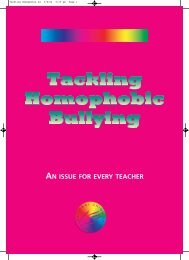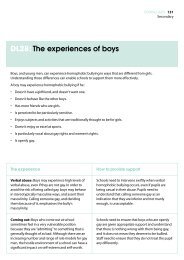Non-Normative Gender and Sexual Identities in Schools: - Schools Out
Non-Normative Gender and Sexual Identities in Schools: - Schools Out
Non-Normative Gender and Sexual Identities in Schools: - Schools Out
You also want an ePaper? Increase the reach of your titles
YUMPU automatically turns print PDFs into web optimized ePapers that Google loves.
Lesbian <strong>and</strong> Gay A4 4/1/04 3:53 PM Page 3<br />
Secondary school pupils <strong>and</strong> college students can<br />
discuss the subjects referred to above <strong>and</strong> also<br />
more complex questions such as prejudice, racism,<br />
sexism, homophobia <strong>and</strong> transphobia. A number of<br />
schools address these topics as part of PSHE. At Key<br />
Stage 4, for example, a requirement with<strong>in</strong> PSHE is<br />
'to challenge offend<strong>in</strong>g behaviour, prejudice,<br />
bully<strong>in</strong>g, racism <strong>and</strong> discrim<strong>in</strong>ation assertively <strong>and</strong><br />
take the <strong>in</strong>itiative <strong>in</strong> giv<strong>in</strong>g <strong>and</strong> receiv<strong>in</strong>g<br />
support' 2 . This could be developed with<strong>in</strong> the<br />
classroom by consider<strong>in</strong>g strategies for challeng<strong>in</strong>g<br />
homophobic bully<strong>in</strong>g, either when directed aga<strong>in</strong>st<br />
oneself or aga<strong>in</strong>st a friend.<br />
Sex <strong>and</strong> Relationships Education<br />
Sex education must be provided for all registered<br />
pupils <strong>in</strong> ma<strong>in</strong>ta<strong>in</strong>ed secondary schools. Govern<strong>in</strong>g<br />
bodies of ma<strong>in</strong>ta<strong>in</strong>ed primary schools are<br />
responsible for consider<strong>in</strong>g whether, <strong>and</strong> at what<br />
stage, to offer sex education. In all ma<strong>in</strong>ta<strong>in</strong>ed<br />
schools, the govern<strong>in</strong>g body must keep an up to<br />
date written statement of the policy they choose to<br />
adopt, which must be available to all parents. DfES<br />
Guidance 3 makes it clear that issues relat<strong>in</strong>g to<br />
sexual orientation should be <strong>in</strong>cluded <strong>in</strong> sex<br />
education programmes. The guidance states:<br />
●<br />
●<br />
●<br />
●<br />
●<br />
●<br />
"The Secretary of State for Education <strong>and</strong><br />
Employment is clear that teachers should be<br />
able to deal honestly <strong>and</strong> sensitively with sexual<br />
orientation, answer appropriate questions <strong>and</strong><br />
offer support."<br />
"It is up to schools to make sure that the needs<br />
of all pupils are met <strong>in</strong> their programmes.<br />
Young people, whatever their develop<strong>in</strong>g<br />
sexuality, need to feel that sex <strong>and</strong> relationships<br />
education is relevant to them <strong>and</strong> sensitive to<br />
their needs."<br />
"<strong>Schools</strong> need to be able to deal with<br />
homophobic bully<strong>in</strong>g."<br />
"The government recognises that there are<br />
strong <strong>and</strong> mutually supportive relationships<br />
outside marriage."<br />
“SRE policies should be <strong>in</strong>clusive of all pupils."<br />
"Hav<strong>in</strong>g a SRE policy <strong>in</strong> l<strong>in</strong>e with this guidance<br />
will be a key part of meet<strong>in</strong>g the criteria for sex<br />
<strong>and</strong> relationship education outl<strong>in</strong>ed <strong>in</strong> the<br />
National Healthy School St<strong>and</strong>ard."<br />
Sex education should challenge the stigmatisation<br />
of lesbian <strong>and</strong> gay families. Many lesbian <strong>and</strong> gay<br />
relationships are stable <strong>and</strong> long-term.<br />
The NUT believes that the follow<strong>in</strong>g pr<strong>in</strong>ciples<br />
should apply to sex education:<br />
●<br />
Sex <strong>and</strong> relationships education, together with<br />
Citizenship <strong>and</strong> PSHE, can help to educate<br />
children <strong>and</strong> young people aga<strong>in</strong>st prejudice<br />
<strong>and</strong> discrim<strong>in</strong>ation, <strong>and</strong> enable them to value<br />
all forms of stable relationships;<br />
●<br />
●<br />
<strong>Schools</strong> should adopt an approach to sex<br />
education which <strong>in</strong>volves everyone <strong>in</strong> the<br />
school. It is important to consult <strong>and</strong> <strong>in</strong>volve<br />
teachers, health workers, parents, governors,<br />
pupils when appropriate, <strong>and</strong> relevant religious<br />
<strong>and</strong> community groups, particularly <strong>in</strong> the<br />
context of the right of parents to withdraw<br />
their children from all or part of the sex<br />
education programme. Wide consultation <strong>and</strong><br />
<strong>in</strong>volvement will reduce the likelihood of<br />
parents request<strong>in</strong>g the withdrawal of their<br />
children from sex education;<br />
School policies on sex education should conta<strong>in</strong><br />
appropriate references to LGB sexuality, <strong>and</strong><br />
gender identity, recognis<strong>in</strong>g that sexual<br />
orientation is a central part of an <strong>in</strong>dividual's<br />
identity; <strong>and</strong><br />
● Effective <strong>and</strong> practical sex education should<br />
foster a sense of respect <strong>and</strong> responsibility. It<br />
should encourage the exploration of values <strong>and</strong><br />
moral issues, consideration of sexuality <strong>and</strong><br />
personal relationships <strong>and</strong> the development of<br />
communication <strong>and</strong> decision-mak<strong>in</strong>g skills.<br />
The NUT advises teachers that, because they are<br />
not health professionals, they should not provide<br />
<strong>in</strong>dividual advice about contraception or abortion<br />
beyond that which may be <strong>in</strong>cluded <strong>in</strong> a sex<br />
education class. A teacher may, however,<br />
legitimately give precise <strong>in</strong>formation about<br />
access<strong>in</strong>g contraception <strong>and</strong> pregnancy advisory<br />
services from appropriate health professionals.<br />
Similarly teachers can give <strong>in</strong>formation about<br />
access<strong>in</strong>g LGBT advisory services <strong>and</strong> local lesbian<br />
<strong>and</strong> gay groups. School noticeboards should be used<br />
so that <strong>in</strong>formation about LGBT advisory services is<br />
easily accessible alongside other material.<br />
OFSTED's report on sex <strong>and</strong> relationships<br />
education 4 says that:<br />
●<br />
"In too many secondary schools homophobic<br />
attitudes among pupils often go unchallenged.<br />
The problem is compounded when derogatory<br />
terms about homosexuality are used <strong>in</strong><br />
everyday language <strong>in</strong> school <strong>and</strong> their use<br />
passes unchallenged by staff. Where these<br />
problems arise, staff have often had <strong>in</strong>sufficient<br />
guidance on the <strong>in</strong>terpretation of school values<br />
<strong>and</strong> what constitutes unacceptable language or<br />
behaviour."<br />
The report <strong>in</strong>cluded the follow<strong>in</strong>g po<strong>in</strong>ts among<br />
the recommendations to all schools:<br />
●<br />
that schools should make sure that values<br />
relevant to education about sex <strong>and</strong><br />
relationships are consistently adhered to with<strong>in</strong><br />
the school so that, for example, homophobic<br />
attitudes do not go unchallenged; <strong>and</strong><br />
2







